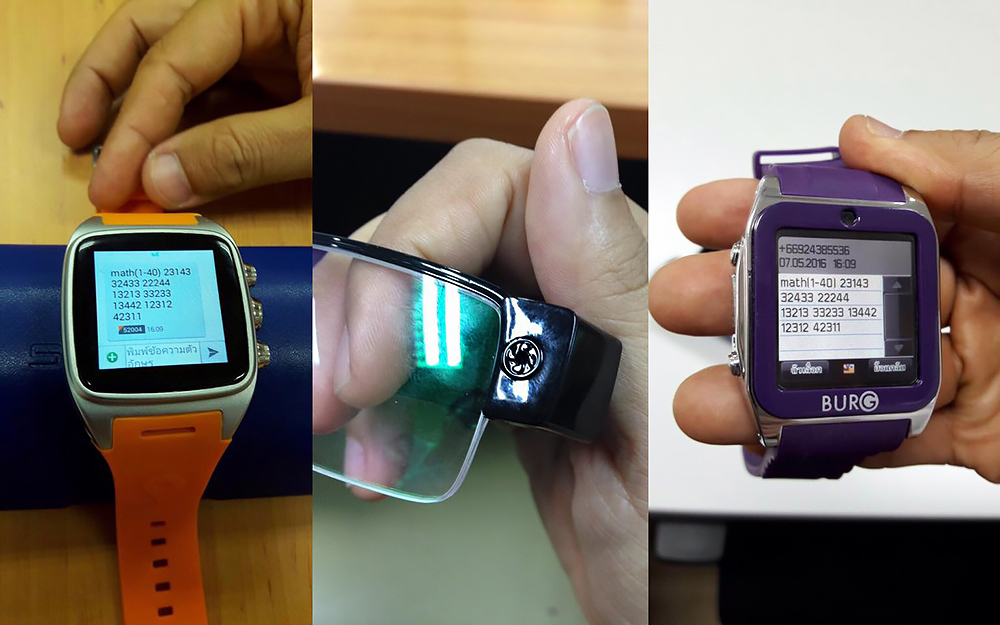


“Cheating has always been a problem that educators must face, and recently technology has been used to help students cheat in increasingly sophisticated ways”.
In May 2016, 3,000 students in Thailand were forced to re-sit their entry exams for a prestigious medical school in Rangsit University in Bangkok, because too many students were cheating and the entire exam was compromised. Students were using tiny cameras embedded in their glasses to record the questions on the exam paper, transmitting the images to an outside team, and then waiting for correct answers to be sent to them via smart watches.
Fortunately, this time the cheating was noticed and punished by the University, who banned all those known to be involved in the scam from re-taking the exam. However, as new technology is developed, we must remain a step ahead of those looking to use it to cheat in exams, and continue to develop even more sophisticated anti-cheating rules, software and technology. Education itself is becoming much more technology driven, and this is manifesting itself in the increase of online courses available, for students and for those looking to improve their skills in the workplace.
Online courses are fast becoming the new face of education. This way of learning is much more accessible for busy students, who may be juggling jobs and families as well as studying in their free time. Organisations like the Open University can deliver high quality degrees at a fraction of the cost of attending a physical university. Additionally, the digital age has made much more information available online, with lectures being recorded and re-watched over the cloud, supplementary reading available as PDF downloads, and interactive timetables used to organise students’ time.
However, while distance learning is evidently beneficial, it creates its own set of problems too. The very nature of online exams means that there is no exam invigilator presiding over students to ensure no cheating takes place, and checking identities as they enter the exam hall. For this reason, it is especially important to address the issue of making sure the person sitting the exam is the student who took the course, rather than a hired expert.
TeSLA is working to develop new solutions for this problem by assembling an array of information security technology, and refocusing it on cracking down on cheats.
As a consortium of multiple infosecurity specialists, TeSLA is developing a system which can accurately detect when someone other than the registered student is completing an assignment or exam online. A mixture of vocal, facial and biometric recognition technology confirms the identity of the participant throughout the entire time the student is taking the exam. It is also able to flag content which has been copied from a third party online resource, helping in the fight against plagiarism.
TeSLA, among others, makes use of Watchful’s TypeWATCH software, which uses Keystroke Dynamics to detect the unique way each person types. This advanced new software can recognise individuals from minute signs such as the order they hit the keys on a keyboard and the way they pause, making it impossible for a student to covertly hand their desktop over to someone else even after the sign in is complete.
Currently in its 2nd pilot phase, the project is being tested by universities across Europe, including the Open University in the UK. Ultimately, the aim is for software developers to create an e-assessment system which can be rolled out for mass use across schools, higher education institutions and vocational training centers.
In this way, the educational sector can continue to keep beating those cheats. We can effectively harness the advanced biometric technology usually used to keep sensitive corporate data private, and re-utilise it for application in the public sphere. Cheaters and hackers will continue to use new technology to dodge current rules and restrictions, and educational institutions must continue to fight them on an equal footing. Our connected world is transforming rapidly, and we must be able to utilise the benefits of this change rather than ignoring the problem and hoping that it goes away.
By Rui Melo Biscaia, Director of Product Management, Watchful Software

FUNDED BY THE EUROPEAN UNION
TeSLA is not responsible for any contents linked or referred to from these pages. It does not associate or identify itself with the content of third parties to which it refers via a link. Furthermore TESLA is not liable for any postings or messages published by users of discussion boards, guest books or mailing lists provided on its page. We have no control over the nature, content and availability of any links that may appear on our site. The inclusion of any links does not necessarily imply a recommendation or endorse the views expressed within them.
TeSLA is coordinated by Universitat Oberta de Catalunya (UOC) and funded by the European Commission’s Horizon 2020 ICT Programme. This website reflects the views only of the authors, and the Commission cannot be held responsible for any use which may be made of the information contained therein.